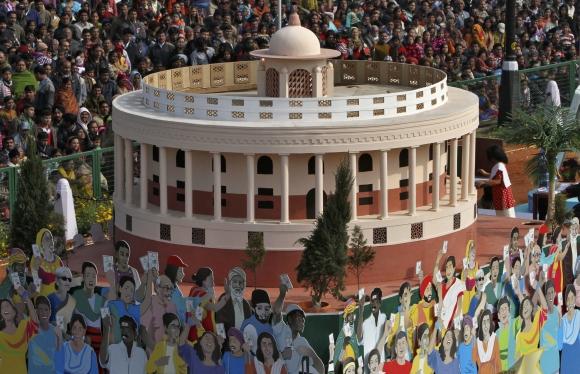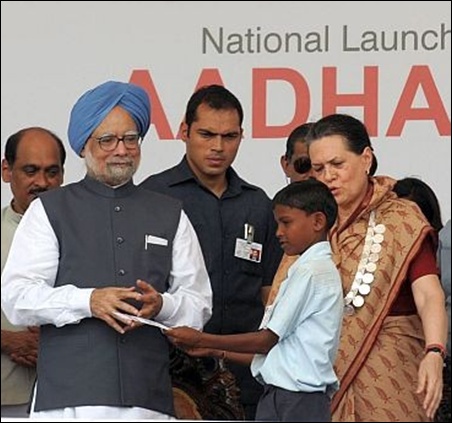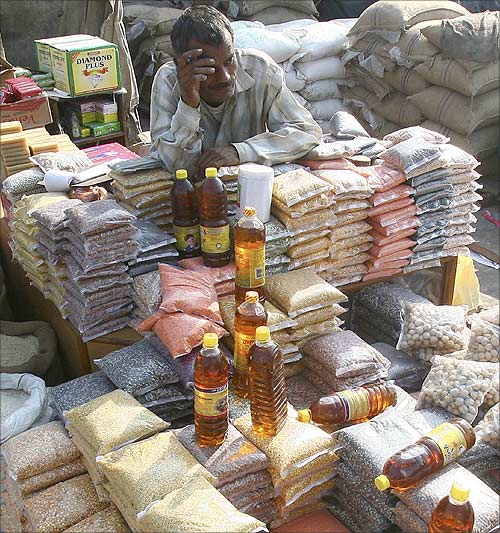Photographs: B Mathur/Reuters M R Madhavan
On several parameters, the performance of the current Parliament has been worse than that of previous ones. These include the number of sittings, percentage of time lost, passing of bills and discussion of budgets, says M R Madhavan
The Parliament session starting Monday is effectively the penultimate session of the current Lok Sabha, not counting the likely truncated Budget session, which will just focus on the vote on account. As we enter the session, it may be timely to see the performance of Parliament in the last four years, and the pending agenda.
In 2009, addressing the joint session after the formation of the current Lok Sabha, the President listed 13 bills as key agenda items for the new government. Whereas several of these have been introduced (and some passed by one House), only one -- the Right to Education Bill -- has been enacted by Parliament. Another, the Food Security Bill has been issued as an Ordinance, and will have to be ratified by Parliament in this session.
The other 11 bills and their status are as follows. Three Constitution amendment bills related to reservation for women in legislative bodies, municipalities and panchayats, of which the first has been passed by Rajya Sabha in 2010. Two bills were to establish national councils on health and higher education -- both are pending in Parliament. A bill to create public services law was promised and introduced as the “Right of Citizens to Time Bound Delivery of Goods and Services and Redressal of their Grievances Bill”, and is now pending in Lok Sabha.
...
Will the worst-performing Parliament clear 116 pending bills?
The bill to amend the Right to Information Act was abandoned after opposition from several activists. The Land Acquisition Bill and the Rehabilitation and Resettlement Bill were combined into one bill which is pending in the Lok Sabha for almost two years.
The pension bill, which was originally introduced in 2005 still eludes a discussion in Parliament. And finally, the Communal Violence Bill was drafted by the National Advisory Council but not introduced.
In addition to these bills, several bills have been pending for a significant amount of time. These affect almost all sectors of the economy. For example, the farm sector is still awaiting the passage of the Seeds Bill and the Pesticides Management Bill. Bills that affect the financial markets (in addition to the Pension Bill) include the Insurance Bill, the Forward Contracts Bill and the Microfinance Bill.
The Companies Bill has been passed by Lok Sabha, and is awaiting consideration by the Rajya Sabha. Several bills that affect the higher education sector are pending for over three years -- these include one to permit foreign universities, one to prohibit unfair practices, one that requires quality accreditation for all courses and one to establish education tribunals.
Interestingly, executive action has overtaken legislative sanction in a couple of instances. The pension sector has been opened up, and the corpus is in tens of thousands of crores of rupees while the relevant bill is still pending consideration. The bill that provides statutory status to the Unique Identification Number authority has not been discussed though the Aadhaar system has been rolled out and will likely be used across the country -- and will be an essential part of the direct benefit transfers being rolled out.
Two key bills that would affect the taxation system -- Direct Taxes Bill and constitutional amendment to enable the goods and services tax are also in the to-do list.
...
Will the worst-performing Parliament clear 116 pending bills?
Photographs: Ajay Verma/Reuters
Several bills were introduced in relation to combating corruption and improving service delivery. None of these -- including the Lokpal Bill, the Judicial Accountability Bill, the Whistleblower Bill, the Citizen Grievances Bill and the Electronic Delivery of Services Bill have been passed.
The government has also tried to pass a few constitutional amendments. One amendment to enable reservations in promotions of public employees with consequential seniority (and retrospective effect) was passed by the Rajya Sabha last December but has not been taken up by the Lok Sabha. Another bill -- that attempts to resolve pending border issues and enclaves with Bangladesh -- was introduced last session; given the election schedule in both countries, there may be a limited window to discuss this issue.
The government will have to get some ordinances ratified this session, failing which they will lapse. The Food Security Bill is likely to be high up in the priority list. Another important ordinance gave powers to Securities and Exchange Board of India to regulate collective investment schemes above Rs 100 crore. The Medical Council of India Ordinance revamps its board and its functions.
Parliament may also discuss some major events that have occurred since the last session. These include issues related to disaster management after the Uttarakhand floods and the attack by left-wing extremists on political leaders in Chhattisgarh. The state of the economy -- falling rupee, continued inflationary pressures and slowing growth -- may also be discussed.
On several parameters, the performance of the current Parliament has been worse than that of previous ones. These include the number of sittings, percentage of time lost, passing of bills and discussion of budgets. Parliament has the opportunity, in this short session, of completing some of the pending work -- in all there are 116 bills that are pending in Parliament. It is a moot question whether our parliamentarians will choose to do so.
M R Madhavan heads PRS Legislative Research.




article